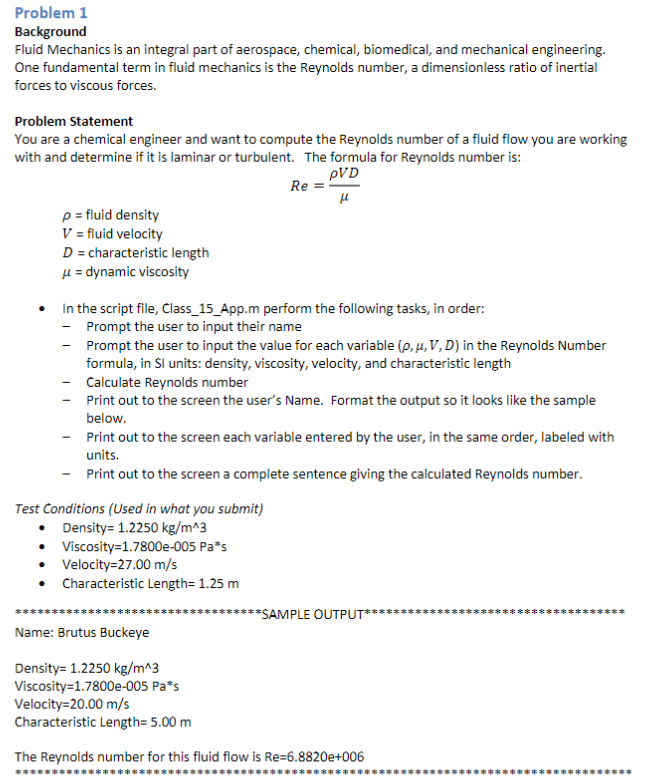Answered step by step
Verified Expert Solution
Question
1 Approved Answer
Matlab Problem 1 Background Fluid Mechanics i an integral part of aerospace, chemical, biomedical, and mechanical engineering. One fundamental term in fluid mechanics is the

Matlab
Problem 1 Background Fluid Mechanics i an integral part of aerospace, chemical, biomedical, and mechanical engineering. One fundamental term in fluid mechanics is the Reynolds number, a dimensionless ratio of inertial forces to viscous forces. Problem Statement You are a chemical engineer and want to compute the Reynolds number of a fluid flow you are working with and determine if it is laminar or turbulent. The formula for Reynolds number is: pVD fluid density V fluid velocity D characteristic length dynamic viscosity In the script file, Class_15_App.m perform the following tasks, in order: - Prompt the user to input their name Prompt the user to input the value for each variable (p, u, V, D) in the Reynolds Number formula, in SI units: density, viscosity, velocity, and characteristic length Calculate Reynolds number - Print out to the screen the user's Name. Format the output so it looks like the sample - Print out to the screen each variable entered by the user, in the same order, labeled with - Print out to the screen a complete sentence giving the calculated Reynolds number below units. Test Conditions (Used in what you submit) Density 1.2250 kg/mA3 Viscosity 1.7800e-005 Pa*s Velocity-27.00 m/s Characteristic Length 1.25 m Name: Brutus Buckeye Density- 1.2250 kg/mA3 Viscosity-1.7800e-005 Pa s Velocity-20.00 m/s Characteristic Length- 5.00 m The Reynolds number for this fluid flow is Re-6.8820e+006 Problem 1 Background Fluid Mechanics i an integral part of aerospace, chemical, biomedical, and mechanical engineering. One fundamental term in fluid mechanics is the Reynolds number, a dimensionless ratio of inertial forces to viscous forces. Problem Statement You are a chemical engineer and want to compute the Reynolds number of a fluid flow you are working with and determine if it is laminar or turbulent. The formula for Reynolds number is: pVD fluid density V fluid velocity D characteristic length dynamic viscosity In the script file, Class_15_App.m perform the following tasks, in order: - Prompt the user to input their name Prompt the user to input the value for each variable (p, u, V, D) in the Reynolds Number formula, in SI units: density, viscosity, velocity, and characteristic length Calculate Reynolds number - Print out to the screen the user's Name. Format the output so it looks like the sample - Print out to the screen each variable entered by the user, in the same order, labeled with - Print out to the screen a complete sentence giving the calculated Reynolds number below units. Test Conditions (Used in what you submit) Density 1.2250 kg/mA3 Viscosity 1.7800e-005 Pa*s Velocity-27.00 m/s Characteristic Length 1.25 m Name: Brutus Buckeye Density- 1.2250 kg/mA3 Viscosity-1.7800e-005 Pa s Velocity-20.00 m/s Characteristic Length- 5.00 m The Reynolds number for this fluid flow is Re-6.8820e+006Step by Step Solution
There are 3 Steps involved in it
Step: 1

Get Instant Access to Expert-Tailored Solutions
See step-by-step solutions with expert insights and AI powered tools for academic success
Step: 2

Step: 3

Ace Your Homework with AI
Get the answers you need in no time with our AI-driven, step-by-step assistance
Get Started


